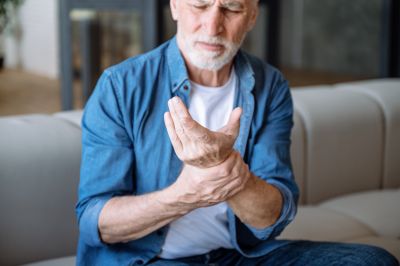Most of us know that calcium is important for strong bones, but did you know that testosterone also plays a crucial role in maintaining your bone health as you age?
While we often hear about estrogen's importance for women's bone health, the connection between testosterone and bone density in men is often forgotten. In this post, you’ll learn why this hormone is so important and what you can do to maintain healthy bones throughout your life.
How Testosterone Protects Men’s Bones
Testosterone works through both direct and indirect pathways to help you maintain strong, healthy bones.
Not only does it work directly on bone tissue, but some of it actually converts to estradiol (a form of estrogen) right inside your bones. This dual action makes testosterone particularly effective at maintaining bone strength.
When testosterone interacts directly with bone tissue, it stimulates the cells that build new bone and helps keep bone breakdown in check.
It also supports calcium absorption and maintains muscle strength, which is crucial for bone health. Meanwhile, the testosterone that converts to estradiol provides additional protection against bone loss and helps maintain bone density.
How Andropause Connects to Bone Health
Men start losing testosterone gradually after about age 30, typically at a rate of 1 to 2% per year, in a process known as andropause.
While this might seem small, it adds up over time and can significantly impact your bone health. This natural decline affects not just bone density but also muscle mass and strength, creating a domino effect that can increase your risk of fractures as you age.
It’s true that some men won’t notice this small loss—even well into their 60s and beyond—but that’s because everyone’s baseline testosterone levels are different. Some men naturally have very high levels of testosterone, and others don’t.
If your testosterone is naturally on the lower end, it’s likely that this gradual loss will push you into low testosterone (low T) territory.
The range for what’s considered a “normal” level of testosterone is large—300 ng/dL to 1,000 ng/dL for total testosterone and 9 ng/dL to 30 ng/dL for free testosterone. Some men are naturally around 800 and above in their 20s, while others (who aren’t experiencing symptoms of low T) are naturally around 400 or 500.
You can see the difference—if your levels sit around 400 in your 20s, you’re going to enter low T territory much more quickly than someone whose levels are in the 800s. However, even men who naturally have “high” levels at a young age may still experience the symptoms of low T as they age, even if their levels are still in that “normal” range.
The takeaway here is that levels shouldn’t be the focus—your symptoms should be. If you’re experiencing the symptoms of low T, regardless of where your levels fall, it’s possible your bone density is being affected as well.
Understanding Your Bone Structure
Your bones aren't just solid structures—they're complex tissues with different layers and components.
The outer layer, called cortical bone, provides strength and protection, while the inner trabecular bone creates a sophisticated framework that helps distribute force and stress throughout your bones. Testosterone helps maintain both these crucial components.
As testosterone levels decline with age, both these bone types can become more vulnerable. The process is gradual but significant, particularly in areas with lots of trabecular bone, like the spine and hips. This is why older men become more susceptible to fractures in these areas.
Protecting Your Bone Health
The good news is that there's plenty you can do to maintain your bone health as you age.
Regular exercise, particularly weight-bearing activities and resistance training, is crucial for your bones. When you exercise, you're not just building muscle—you're actually stimulating bone formation and helping maintain bone density.
Nutrition plays a vital role, too. Your bones need more than just calcium—they require a balanced diet with adequate protein, vitamins (especially vitamin D), and minerals.
When to Consider Medical Help
Sometimes lifestyle changes aren't enough, particularly if you're experiencing significant testosterone decline. This is when it's important to work with healthcare providers who can monitor your testosterone levels and bone density.
They might recommend treatments like testosterone replacement therapy (TRT) or bone-strengthening medications, depending on your specific situation.
It's worth noting that you shouldn't wait until you have problems to get your bone health checked. Regular monitoring becomes increasingly important as you age, and early intervention can prevent significant bone loss before it occurs.
Maintaining Bone Health Helps You Stay Active and Independent
Maintaining healthy testosterone levels and strong bones isn't just about preventing fractures—it's about preserving your quality of life as you age.
Good bone health helps you stay mobile, reduces your risk of falling, reduces the potential for a serious injury if you do happen to fall, and allows you to stay independent. It affects everything from your posture to your strength to your ability to stay active and engaged in life.
The connection between testosterone and bone health also highlights how interconnected our body systems are. When you take steps to maintain healthy testosterone levels—like staying active, eating well, managing stress, and getting good sleep—you're not just supporting your bone health: you're improving your overall well-being.
If You’re Experiencing the Symptoms of Low T, We Can Help
It's never too early to start thinking about bone health, and it's never too late to make positive changes.
Whether you're in your 30s and want to build strong bones for the future or you're older and focused on maintaining what you have, taking action to support your bone health is always worthwhile.
If you’re experiencing the symptoms of low T, your next step is to get your hormone levels tested.
Learn more about TRT here. You can also schedule an appointment with a specialist today to discuss getting your levels tested.

